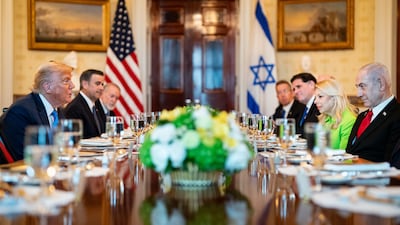Gaza ceasefire negotiations under way in Qatar are slowly progressing towards a possible deal to pause the 21-month-old war, sources told The National on Tuesday.
They said Hamas and Israel were in agreement over the core provisions of the deal, including a 60-day truce, the release of hostages held in Gaza and the entry of humanitarian assistance. However, differences remain between the two sides.
“Things are generally going well, but it may be a while yet for an announcement that a deal is reached,” said one of the sources.
The talks in Doha began on Sunday, with US, Egyptian and Qatari mediators shepherding the process amid renewed interest by US President Donald Trump in ending the war.

Mr Trump's Middle East envoy Steve Witkoff will join the talks later this week, according to White House press secretary Karoline Leavitt.
“I don't think there is a hold-up. I think things are going along very well,” Mr Trump told reporters on Monday night as he hosted Israeli Prime Minister Benjamin Netanyahu in Washington. Hamas was willing to end the war, he added.
Senior Israeli officials briefing journalists in Washington said it may take more than a few days to finalise a deal, according to Reuters. Another Israeli official said progress had been made, but he did not elaborate.
Israeli Minister Zeev Elkin, who sits on Mr Netanyahu's security cabinet, said there was “a substantial chance”, that a ceasefire would be agreed.
“Hamas wants to change a few central matters, it's not simple, but there is progress,” he told Israel's public broadcaster Kan on Tuesday.
Eviction plan
The sources said Hamas and Israel were at odds over the distribution of humanitarian assistance in Gaza, with the Palestinian group insisting that it is carried out by the UN and associated agencies.

Israel also remained opposed to the release of high-profile Palestinians serving long-term jail terms in its prisons, they said. Israel is expected to free about 1,000 prisoners in return for 10 hostages held by Hamas and the remains of 18 others who died in captivity during the proposed 60-day ceasefire.
There are 50 remaining hostages in Gaza, of whom 20 are believed to be alive.
Israel also rejects Hamas's demand that it withdraws fully from Gaza, insisting on maintaining a security presence in the territory, including a narrow but strategic strip that runs parallel to the border with Egypt, the sources said.
However, comments by Mr Trump and Mr Netanyahu on relocating Gaza's Palestinians away from the enclave have cast a dark shadow on the talks.
The idea of resettling Gazans was first floated by Mr Trump in January, when he said they could move to Egypt and Jordan as a prelude to developing the territory into a glitzy beach resort.
He has infrequently mentioned the idea since then, giving its critics hope that it could be shelved. However, comments by the US and Israeli leaders in Washington on Monday night suggested that it continues to be seriously pursued by the two close allies.
When asked about displacing Gaza's Palestinians, Mr Trump initially deferred to Mr Netanyahu, saying the countries around Israel were helping out.
“We've had great co-operation from … surrounding countries. … So something good will happen,” he said. Mr Netanyahu said his country was working with Washington to find other countries to agree to such a plan.

There are growing signs that an eviction plan is already under way, with Israel creating conditions in Gaza that render normal life close to impossible for residents of the Palestinian territory.
“The eviction of Palestinians from Gaza has since January been hanging over the ceasefire talks,” said another one of the sources. “It appears to be the end game plan by Israel and the Trump administration.”
Egypt and Jordan have rejected Mr Trump's idea, with Cairo saying that it poses a threat to its national security.
The Gaza war began on October 7, 2023, when Hamas-led militants stormed into southern Israel, killing about 1,200 people and taking 251 hostages into Gaza.
Israel's subsequent military campaign in Gaza has since killed more than 57,500 Palestinians, according to local health authorities. It has also displaced almost the entire population of more than 2.3 million people, created a humanitarian crisis and left much of the territory in ruins.



